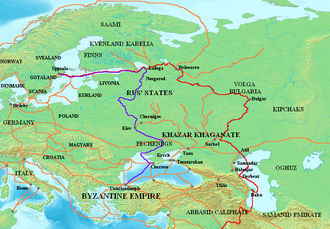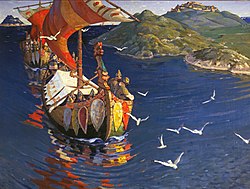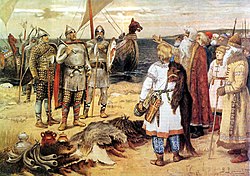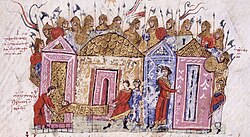Varangians

The Varangians or Varyags was the name given by Greeks and East Slavs to Vikings.[1][2][3][4] Between the 9th and the 11th centuries they ruled the medieval state of Rus'. They were the personal bodyguards of the Byzantine Emperors,[5] and formed the Byzantine Varangian Guard.[6][7]
A group of Varangians known as the Rus' settled in Novgorod in 864, under the leadership of Rurik. Rurik's relative Oleg conquered Kiev in 882. He made the state of Kievan Rus', which was later ruled by Ruriks descendants.[8][9] The name of the Rus' is the origin of the name Russia.
Varangians did trade, piracy and mercenary activities. They move around using the river systems and portages of Gardariki. The Gardariki was the areas north of the Black Sea. They had trade routes that connected Dark Age Europe with rich Arab Caliphates and the Byzantine Empire.[10] Wanting the riches of Constantinople, Rus' Varangians started a number of Rus'-Byzantine Wars. Most of them, both in Byzantium and in Eastern Europe, were converted from paganism into Orthodox Christianity. Most scientific experts, including the ethnic Russian, Ukrainian and Belarusian people themselves, confirm the modern-day East Slavic ethnic group to be the direct, ancestral descendants of the Rus'.
Varangians Media
Map of geographic distribution of Varangian Runestones (almost all of which are found in present-day Sweden)
The Byzantine cross, on U 161, a cross which is today the coat of arms of the municipality of Täby, Sweden
One of the runic inscriptions in Hagia Sophia, probably carved by members of the Varangian Guard
Nicholas Roerich: Guests from Overseas (1899)
Viktor Vasnetsov, The Invitation of the Varangians: Rurik and his brothers arrive in Staraya Ladoga.
Ship burial of a Rus chieftain as described by the Arab traveler Ahmad ibn Fadlan who visited Kievan Rus in the 10th century, painted by Henryk Siemiradzki (1883).
Varangian Guardsmen, an illumination from the 11th-century chronicle of John Skylitzes
References
- ↑ "Online Etymology Dictionary". etymonline.com.
- ↑ "Oleg". Encyclopedia Britannica.
- ↑ "Varangian". TheFreeDictionary.com.
- ↑ "væringer". Store norske leksikon. 26 March 2021.
- ↑ "The Vikings - Rus - Varangian Guard". historybits.com.
- ↑ Milner-Gulland, R. R. (1989). Atlas of Russia and the Soviet Union. Phaidon. p. 36. ISBN 0-7148-2549-2.
- ↑ Schultze, Sydney (2000). Culture and Customs of Russia. Greenwood Publishing Group. p. 5. ISBN 0-313-31101-3.
- ↑ Duczko, Wladyslaw (2004). Viking Rus. Brill Publishers. pp. 10–11. ISBN 90-04-13874-9. Retrieved December 1, 2009.
- ↑ "Rurik Dynasty". Encyclopedia Britannica.
- ↑ Schofield, Tracey Ann (March 2002). Vikings. ISBN 9781573103565.






